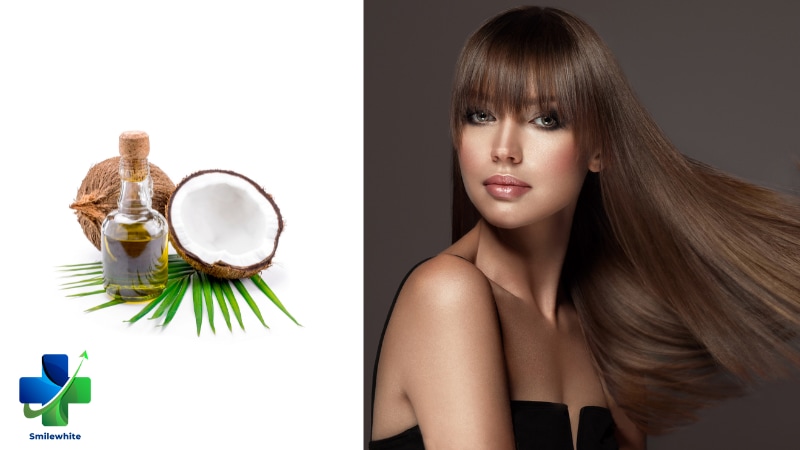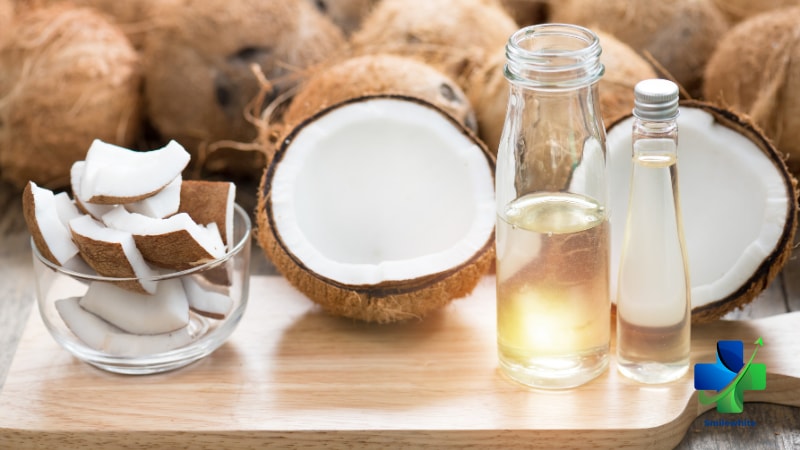Beauty Blog
Is Coconut Oil Good for Curly Hair? Expert Insights and Tips
Caring for curly hair is essential for individuals with wavy, curly, or coily textures. Curly hair requires special care and tailored products to keep it healthy.
This blog delves into understanding and tackling the distinctive challenges of curly hair to enhance its innate beauty. We’ll explore the key query: Is coconut oil beneficial for curly hair? and its advantages for those with natural curls.
Is Coconut Oil Good for Curly Hair?
Coconut oil proves to be a top-notch addition to your hair care routine. Whether applied directly to dry strands or infused in shampoo and conditioner, it offers remarkable benefits.
- Deep Moisturization: Curly hair often suffers from dryness. Coconut oil deeply penetrates hair follicles, moisturizing from within, resulting in luscious, silky curls.
- Frizz Fighting: Say goodbye to chaotic strands! Coconut oil serves as a shield against frizz by smoothing the hair cuticle and taming unruly flyaways, even in humid weather.
- Added Strength: Strengthening your hair, coconut oil makes it more resilient and less prone to damage. Expect healthier, shinier, and more vibrant curls that withstand everyday challenges.
- Curl Definition: Achieve defined curls effortlessly. Coconut oil helps enhance your natural curl pattern, reducing the need for extensive styling.

Uses of Coconut Oil for Your Hair
While there’s no definitive evidence supporting coconut oil’s ability to accelerate hair growth, it undeniably enhances hair and scalp health, potentially imparting a faster-growing appearance.
- Fights Fungal Infections: Healthy hair roots are essential for robust growth. Recent research suggests coconut oil’s efficacy in combating certain fungal infections, potentially aiding in dandruff prevention and scalp health improvement. Further studies are warranted to validate these skin and scalp benefits.
- Calms Irritation: With its rich saturated fat content, coconut oil offers a natural solution for soothing scalp irritation, flakiness, and itching. Its fat composition also seals in moisture, promoting overall scalp wellness.
- Treats Split Ends: Studies reveal coconut oil’s superior ability to penetrate hair strands compared to other oils, aiding in hair breakage and split end prevention. Regular application may reduce the need for frequent trims, creating an illusion of faster hair growth. Additionally, coconut oil usage in India has shown to diminish protein loss, thereby preventing dry, brittle hair.
- Protects from Heat Damage: Applying a small amount of coconut oil to damp hair before heat styling can shield it from water and heat-induced damage. Coconut oil’s hydrating properties help mitigate hygral fatigue, a condition where excessive water causes hair to swell and weaken over time, leading to drier, fragile strands.
Popular Ways to Combine Coconut Oil
Coconut oil stands out as a highly versatile hair care elixir, serving as a pre-shampoo treatment, conditioner, styling aid, or mask. Here are five effortless ways to elevate your hair care routine with coconut oil:
- Prewash Protector: Apply coconut oil before shampooing to shield your hair from excessive water absorption, safeguarding against damage and dryness. Focus on the midsection and ends, allowing it to sit for 15 to 30 minutes before washing.
- Conditioner: Strengthen your hair shaft and prevent breakage by using coconut oil as an alternative to conventional conditioners. Add a few drops to your regular conditioner for an extra smoothing boost.
- Styling Aid: Combat frizz with a small amount of coconut oil applied to damp hair. Its lightweight formula absorbs easily, helping manage flyaways and imparting a glossy finish.
- Hair Mask: Treat your hair to a deeply nourishing session by massaging a teaspoon or two of coconut oil into your locks. Rinse it out after a few hours or leave it on overnight for extra dry or damaged hair. This intensive conditioning treatment leaves hair soft and rejuvenated.
- Sun Protection: While more research is needed, coconut oil may offer some protection against sun damage. Apply a small amount to your hair before sun exposure to help shield it from harmful UV rays.

Tips for Using Coconut Oil in Hair Care
For optimal results, follow these steps to apply coconut oil:
- Choose Raw Coconut Oil: Opt for raw, unrefined coconut oil to harness its purest form and all-natural benefits.
- Smooth Onto Hair: Begin by applying the coconut oil to dry hair. Start with a small amount and gently smooth it onto your hair. Use a comb to ensure even distribution, paying extra attention to the midsection and ends.
- Absorption Time: Allow the coconut oil to penetrate your hair by leaving it on for at least 15 to 30 minutes. This gives ample time for absorption, maximizing its nourishing effects.
- Thorough Washing: Rinse your hair thoroughly with a quality shampoo. You may need to shampoo twice to effectively remove all traces of oil. Follow up with your regular conditioner to leave your hair feeling clean, soft, and rejuvenated.
Reasonable Frequency of Using Coconut Oil for Hair
Studies show that applying coconut oil to your hair once or twice a week can help minimize damage, like hair breakage. However, the frequency of use may vary based on your hair type.
General Recommendation: Apply coconut oil once or twice a week.
- For Fine Hair: Opt for less frequent application, around once a week, to prevent hair from feeling weighed down.
- For Thick or Dry Hair: Consider using coconut oil up to three times a week to provide additional moisture and protection.
Disadvantages of Coconut Oil for Hair
Coconut oil offers numerous benefits for hair, but it’s essential to be aware of potential drawbacks. Individuals allergic to coconut may experience adverse reactions, such as allergic contact dermatitis, when using products containing coconut oil.
Downsides:
- Weighs Down Fine Hair: Using too much coconut oil can flatten fine hair, giving it a greasy and limp appearance. To prevent this, apply a small amount sparingly.
- Potential for Build-Up: Excessive use of coconut oil can cause build-up in coarse hair, leaving it heavy and oily. Regular cleansing helps prevent this issue.
- Clogged Pores: Some individuals may develop clogged pores or experience scalp irritation from coconut oil use, leading to acne-like breakouts.

When Should You Avoid Using Coconut Oil Overnight on Your Hair?
- Consider Alternatives: If coconut oil isn’t suitable for your hair, try lighter oils like argan or jojoba oil.
- Use Moderately: Apply coconut oil sparingly to prevent buildup and scalp issues.
- Seek Professional Advice: Consult a hairstylist regularly to customize your hair care routine based on your hair type and condition.
Is Coconut Oil Good for Baby Hair?
Coconut oil can be beneficial for babies, especially in treating cradle cap, a common scalp condition. Here’s how to use coconut oil for your baby’s hair:
Treating Cradle Cap: Apply coconut oil gently to your baby’s scalp to alleviate the symptoms of cradle cap, helping to soften and loosen crusty patches.
Application:
- Massage a small amount of coconut oil onto your baby’s scalp with gentle motions.
- Leave it on for approximately 20 minutes to allow the oil to penetrate and soften the affected areas.
Rinse and Comb:
- After 20 minutes, rinse the oil off your baby’s scalp using a gentle baby shampoo.
- Use a soft brush to comb through your baby’s hair, removing any loosened flakes.
Notes:
- Perform a Patch Test: Always conduct a patch test on a small area of your baby’s skin to ensure there are no allergic reactions.
- Use Gentle Products: Opt for baby-safe shampoos and conditioners to rinse off the coconut oil.
- Consult a Pediatrician: If cradle cap persists or if you observe any signs of irritation, seek advice from a pediatrician.
FAQs
Does coconut oil make your hair curly?
No, coconut oil does not change your hair’s natural curl pattern. However, it can enhance your curls‘ appearance by providing moisture and reducing frizz, promoting overall hair health, and making your curls look more defined and vibrant.
Is coconut oil good for wavy hair?
Yes, coconut oil is beneficial for wavy hair. It moisturizes and nourishes the hair, enhancing the natural wave pattern, reducing frizz, and adding a healthy shine. Use it in moderation to avoid weighing down your hair.
Is coconut oil good for 4c hair?
Yes, coconut oil is beneficial for 4c hair. Its deep moisturizing properties combat dryness and reduce breakage, improving overall hair health. It can be used as a pre-wash treatment, deep conditioner, or sealant to lock in moisture.
Is coconut oil bad for curly hair?
Coconut oil is generally not bad for curly hair, but it may not suit everyone. Some curly hair types might find it too heavy, leading to buildup and a greasy appearance. Experiment and observe how your hair responds before incorporating it into your routine.
Conclusion
In conclusion, this blog has addressed the question: Is coconut oil good for curly hair? Incorporating coconut oil into your curly hair care routine can offer a range of benefits.
Its deep nourishing properties penetrate the hair shaft, providing essential moisture and reducing frizz. Coconut oil also helps protect your curls from protein loss and serves as a gentle, natural alternative to commercial hair products. However, it’s important to remember that not all hair types may respond the same way to coconut oil.
